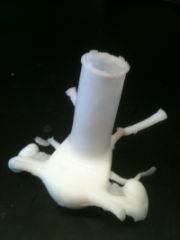Injectable hydrogels
Hydrogels are natural materials for in vivo use as bulking and support agents. Although often not sufficiently strong to provide mechanical support, they frequently can be used in the body to replace or support existing soft-tissue structures. In addition, hydrogels are often ideal in sensor applications where their high permeability allow ready diffusing of solutes, while still trapping active ingredients. Cambridge Polymer Group has extensive experience in developing and working on a number of injectable formulations that have been considered for spine, cardiovascular and urinary applications. We have performed two NIH SBIR grants on leveraging our unique PVA-based non-toxic injectable formulations for either nucleus replacement or urinary incontinence. This system is based on poly(vinyl alcohol) but utilizes a gelling method that allows use without crosslinkers or thermal cycling (so-called “cryogels”). These “thetagels” can therefore make use of poly(vinyl alcohol)’s excellent biocompatibility record, but allow use in applications requiring injection, a situation where PVA was previously unusable. This same system is also the biomaterial under investigation in an active NIH R01 grant with Dr. Judy Hung at the Massachusetts General Hospital (grant R01 038176) with a number of publications.
